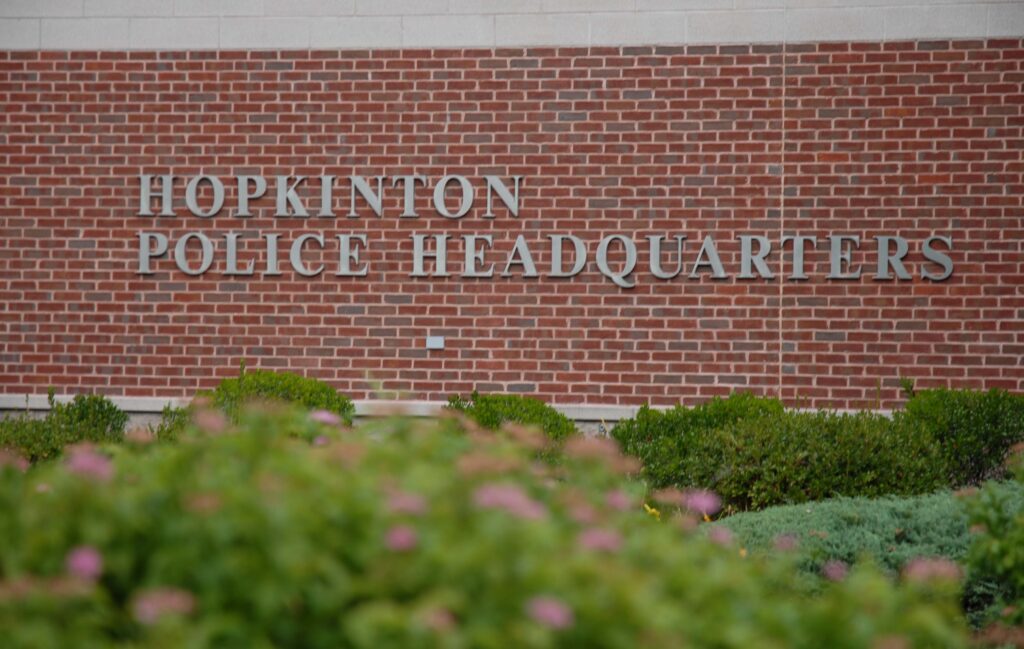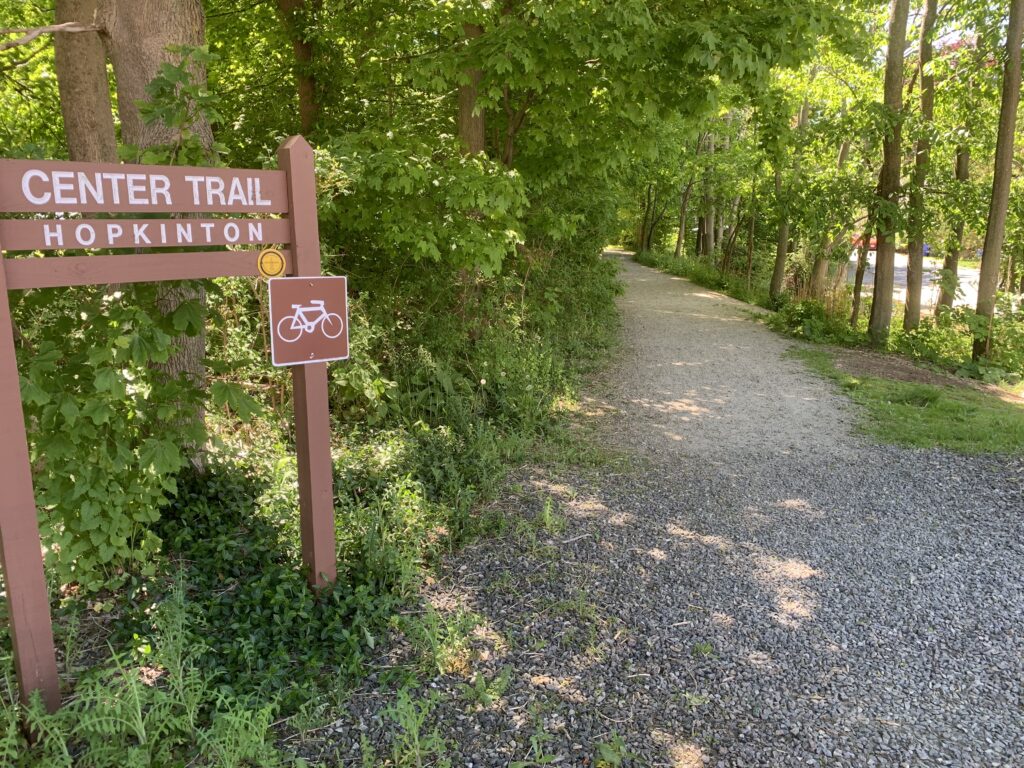Residents gathered in the basement of Town Hall on Thursday night to hear an overview of the town’s proposed municipal aggregation plan.
Consultants Marlana Patton and Paul Gromer of Mass Power Choice were on hand to guide residents through high-level details of the plan and what it means for energy customers in town.
“It’s a governing document that lays out the structure of the program and how it’s going to meet regulatory requirements,” Patton said.
Patton began with the basics of the proposed aggregation program – to be known as Hopkinton Power Choice — along with its benefits, effects and timeline.
“This is an electricity program from and for Hopkinton,” she said.
In a municipal aggregation program, towns, rather than individual customers, purchase electricity from a supplier. According to Patton, this group purchasing power allows access to cleaner energy, new electricity choices and stable prices.
Under Hopkinton Power Choice, the price of electricity would be fixed under a long-term contract, typically one to three years.
“There’s a potential for [residents] to save money with the program because, ideally, the town’s going to be able to get prices that are competitive to those from Eversource,” said Patton.
She cautioned, however, that price savings could not be guaranteed. By law, Eversource is required to buy electricity every six months, and “we don’t know what their future prices are going to be,” she said.
Patton also explained that while the town will get its choice of supplier, Eversource will remain its utility provider. “They own the poles and wires,” she clarified.
Once the plan is up and running, most customers in town will be enrolled automatically. However, they can opt out at any point without penalty. Anyone who currently has a private contract with an electricity supplier will not be auto-enrolled and will be eligible once their current contract expires.
Patton warned that those who re-enroll after opting out may get offered market price. “You’re not guaranteed the program price when you come back,” she said. “They [the supplier] commit to selling electricity at a certain price to a certain customer base.”
Enrolled residents have a choice of three options to receive their electricity: Hopkinton Basic, Hopkinton Standard and Hopkinton Green.
The basic plan provides the minimum amount of renewable energy required by law. It is the same mix Eversource provides, but according to Patton, the fixed price would come in lower than what Eversource charges.
Hopkinton Standard is the auto-enrollment option. It provides some additional renewable energy beyond state requirements, though how much is not yet known.
Hopkinton Green provides customers with 100% clean, renewable energy. Of the three options, it is the most expensive.
After providing the program overview, Patton discussed the timeline and next steps. She explained that the total process takes about one year, from the initial town vote to program launch.
While the town first voted for a municipal aggregation plan more than a decade ago, the process had stalled because of pricing concerns. It was resurrected in the last few years due to shifting energy costs and changes in the program.
Now that the initial plan is developed, it has moved into the 30-day public review period required by the Department of Public Utilities.
The agency requires this initial plan to be available for public review and comment prior to regulatory submission. The review process is slated for completion four months after the end of the public notice period.
Once the plan is approved, the town will choose its supplier and notify the public.
Six to eight weeks before launch, pricing and program details will become available. Residents will get an official town notice in the mail. There will be public announcements, updates to the program website and public information sessions.
Once her presentation was complete, Patton took questions from attendees.
Geoff Rowland, chair of the Sustainable Green Committee, inquired about the decision process for choosing an electricity supplier.
“I’m working with Elaine [Lazarus] to flesh that out,” said Julia Chun, the town’s sustainability, economic development and equity project manager.
“We’re working toward creating a framework for decision making,” she added.
Rowland also asked about the impact the municipal aggregation plan would have on businesses in town.
Patton responded by saying that any Eversource account in town would get notice and be eligible, but large commercial and industry customers would be offered market price.
“Large commercial customers can shop for a more competitive price anyways,” said Patton, “but for small businesses, it’s going to be a good option.”
Patton also responded to questions about how the aggregation program would impact users of solar power. She assured residents that the program would have no impact on participation in community solar or how solar credits currently function.
Residents who could not attend the meeting still have an opportunity to review and comment on the plan. It is available online at HopkintonPowerChoice.com. The open comment period ends Sept. 9.
Comments can be emailed to Julia Chun at jchun@hopkintonma.gov. Residents also have the option to send their comments by U.S. mail to: Julia Chun, Town Manager’s Department, Hopkinton Town Hall, 18 Main Street, Hopkinton, MA 01748.
Comments sent by mail must be postmarked before the end of the comment period in order to be addressed.





















Based on a recent study by researchers from UMass Amherst the average savings to a user on the basic plan offered by power aggregators is $0.0088 per KW Hour. So, based on my usage, I would save about $50 per year (plus or minus) by using the proposed basic plan. MA Power Choice and their owner Peregrine Energy Group are power brokers who surely make considerable profits from these programs (likely much more than the consumer).
Questions: Who will bare the administrative costs of the program??? Will the Town require added staffing for the program; the costs of which would eventually be passed on to residents in the form of ever-increasing taxes??? I’d hate to think that resident’s potential savings would be less than the resulting cost increases of additional Town employees; but then again this is Hopkinton.
In my opinion, the meager savings projected by the Umass researchers aren’t worth the programs costs (which nobody seems to be talking about) and the program is primarily designed to enrich some very large corporations. For those residents who want to opt for “greener” power, they already have many choices and only need to follow-up on the countless offers from power brokers that come to us in the US mail each week.
To “Anonymous,”
If you choose not to opt out of the program entirely you will have three plan options. If you don’t like the plan you’re in, you may choose a cheaper, less green option at any time without penalty.
Administration is handled by the company with which Hopkinton has contracted. There are no plans to hire additional Hopkinton personnel to support this program. Administrative costs are built into the program and are not passed on to taxpayers.
This is a municipal group purchase program, so it’s not like those offers you’ve been getting in the mail. However, if you are already participating in a community solar program, getting solar credits, or benefiting from fuel assistance, you may continue to do so while participating in this program.
You are allowed to opt out of the program at any time. If you wish to opt back in again you may do so, subject to certain rules.
The program offers you many more options than you have right now.
In my opinion this is a wonderful opportunity for all of us and my only regret is that we were not able to implement this sooner.
If you wish to learn about the program, please consult https://www.masspowerchoice.com/hopkinton
I don’t understand where the potential savings comes from. Right now Eversource customers already pay two separate fees as shown on the billing detail in our utility bills, the generator fee (supplier) and the transmission fee (provider). Eversource negotiates with generators for their rates and we have a green energy tiered option through Eversource. How do we as a town have more bargaining power with generators than Eversource? I’m not saying we don’t, I just don’t understand how that works because the Eversource customer base is so much larger than the population of Hopkinton. It seems like we’re adding another middleman to the process and they must be making money somehow. And will there be any changes to Eversources transmission fees if we participate in the program? If we’re saving some on the generator side, but end up paying more on the transmission side that’s not an overall savings for the customer. If this is really a way to try to make renewable energy more affordable (vs the overall energy bill), then we need to be clear about it so customers can make an informed decision.
Why does this feel a bit sketchy to me? Am I being too suspicious by thinking that this may be a backdoor attempt by clean-energy fanatics to force town residents into purchasing renewable energy at higher prices, despite promises to the contrary? Whenever govt starts meddling like this, it usually ends badly for the people they are trying to “help”.
I don’t think there’s anything sketchy behind it, particularly if you’re a consumer that wants green energy at a lower price. I’m just less sure it’s a benefit to customers that want the cheapest power available regardless of the source.
Hi Aaron,
Do you participate in group health insurance? It’s the sample principle. Municipal aggregation enables us to negotiate the lowest rates through bulk purchasing, market competition, and longer contracts.
According to a recent study by UMass Amherst, most Massachusetts towns and cities have in fact saved money through their aggregation plans. For details please see https://www.mma.org/wp-content/uploads/2023/02/UMASS_cce_aggregation_final_report_3.28.23.pdf
And again, if you don’t like the plan, just opt out. I do think that at least trying it out for awhile would be more prudent, but it’s your choice.
Thanks Amy. I’m guessing any savings from the generator comes from the longer contract terms, which as the article points out, can be a double-edged sword. It was the bulk purchasing I wasn’t understanding as our bulk purchasing power is so much smaller than that of Eversource. But, it still seems like it might be a good choice for consumers that feel strongly about purchasing renewable energy.